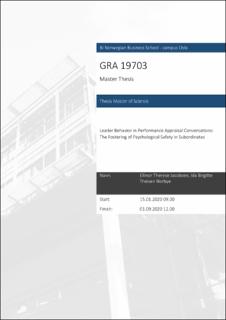Leader Behavior in Performance Appraisal Conversations: The Fostering of Psychological Safety in Subordinates
Abstract
Purpose: The purpose of this study is to shed light on the leader-subordinate
interaction as it unfolds during the performance appraisal conversation. More
specifically, the aim is to look into how Model Ⅱ behavior in the leaders may
contribute to psychological safety in the subordinates. By doing this, we answer
the call of more qualitative studies in this field, which is needed in order to
bridge the gap between scholars and practitioners.
Research Methodology: The study was conducted by recording the
performance appraisals of five leader-subordinate dyads in an organization, and
by handing out a survey to the parties in the dyad afterwards. The performance
appraisals were transcribed and coded based on a codebook partially developed
by Meyer and colleagues (2019). The coded findings were then compared to
answers from the survey. Additionally, patterns found within the performance
appraisal conversation were highlighted.
Findings: Our findings suggest that leaders managed to maintain the
relationship with the subordinate, but especially due to a lack of inquiry, the
subordinate’s voice remained limited. The result is an ineffective PA,
suppressed psychological safety, and limited learning opportunities for both
parties. Further, our findings propose that the overuse of active-empathetic
listening behavior such as humming can be counterproductive.
Implications: Our overall findings suggest keeping the traditional performance
appraisal, but with some alterations and leadership development in order to
make it more effective. Further, our findings arguably reflect the importance of
the leader’s behavioral nuances in relation to psychological safety in the
performance appraisal. This notion directs future research into also looking at
authentic behavior, and not only subordinates’ perceptions in surveys, when
studying the performance appraisal, not.
Description
Masteroppgave(MSc) in Master of Science in Leadership and Organizational Psychology - Handelshøyskolen BI, 2020
